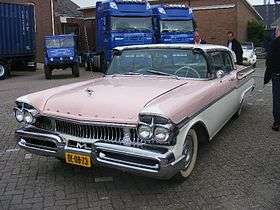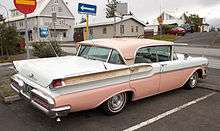Mercury Turnpike Cruiser
| Mercury Turnpike Cruiser | |
|---|---|
 1957 Mercury Turnpike Cruiser | |
| Overview | |
| Manufacturer | Mercury (Ford) |
| Also called | Mercury Convertible Cruiser |
| Model years | 1957–1958 |
| Assembly |
St. Louis, Missouri Pico Rivera, California Atlanta, Georgia Mahwah, New Jersey |
| Body and chassis | |
| Class | Full-size car |
| Body style |
2-door hardtop coupe 4-door hardtop sedan 2-door convertible |
| Layout | FR layout, body-on-frame |
| Related |
Mercury Montclair Mercury Colony Park |
| Powertrain | |
| Engine |
368 cu in (6.0 L) Y-Block V8 383 cu in (6.3 L) Marauder V8 430 cu in (7.0 L) Marauder V8 430 cu in (7.0 L) Super Marauder V8 |
| Transmission | 3-speed Merc-O-Matic automatic[1] |
| Dimensions | |
| Wheelbase | 122 in (3,099 mm) [1] |
| Length | 211 in (5,359 mm) |
| Width | 79.1 in (2,009 mm) |
| Height | 56.5 in (1,435 mm) [1] |
| Chronology | |
| Successor | Mercury Park Lane |
The Mercury Turnpike Cruiser is a full-size automobile that was the flagship model of the Mercury division of Ford Motor Company for the 1957 and 1958 model years. Named after the 1956 creation of the Interstate Highway System, the Turnpike Cruiser was produced in two-door and four-door hardtop bodystyles. In 1957, a two-door convertible was also produced, serving as the pace car for the Indianapolis 500 of that year.
They are best known for the unique styling cues and wide array of gadgets including a "Breezeway" power rear window that could be lowered to improve ventilation, "twin jet" air intakes at upper corners of car's windshield, "seat-o-matic" automatically adjusting seat,[2] and an average speed "computer" (that would tell your average speed at any point along a trip).[3][4]
1957

For 1957, the Turnpike Cruiser was the premium model offering from Mercury. In addition to its unique features, the car was further differentiated from other Mercury models by a gold anodized trim strip in the car's rear fin. It came standard with an automatic transmission and a 368-c.i.d. engine producing 290 horsepower (220 kW); this engine was optional on other Mercurys. A tachometer was available.[5] Safety features such as an impact absorbing, deep-dish steering wheel and safety door locks were standard, while seat belts and a padded dash were optional.[6]
The Turnpike Cruiser would comprise 8.47% of Mercury sales in 1957.[1] Motor Trend gave high marks for fuel economy (14.6mpg at 60mph) and comfort, low for handling.[7]
Convertible Cruiser
.jpg)
Later in the model year an open car named Convertible Cruiser was added to this series. From the beginning it was created only to be used as the official pace car of the 1957 Indianapolis 500. On January 7, 1957, it was announced that the Convertible Cruiser would be available as a production model as well. All Convertible cruisers had a continental tire kit and were painted yellow (Sun Glitter), similar to the original pace cars.
1958
In 1958 the Turnpike Cruiser joined the mid-range Mercury Montclair line with only minor trim changes to the car from the previous year, but the convertible version was not offered this year. A further upgrade of luxury equipment and appearance of the Turnpike Cruiser became the Mercury Park Lane which replaced it entirely for 1959.
Standard engine became the 383-c.i.d. "Marauder" V8 engine, with the 430-c.i.d., 360 horsepower (270 kW) version available as an option. A triple-carburetor"Super Marauder" 400 horsepower (300 kW) version was available across the Mercury line. Self-adjusting brakes were added.[8]
From 1963 to 1966 Mercury revived the most distinctive feature of the Turnpike Cruiser, returning a retractable "Breezeway" rear window, on its full-size Monterey, Montclair and Park Lane model ranges.[9]
References
- 1 2 3 4 Flory, Jr., J. "Kelly" (2008). American Cars, 1946-1959 Every Model Every Year. McFarland & Company, Inc., Publishers. ISBN 978-0-7864-3229-5.
- ↑ "Directory Index: Mercury/1957 Mercury/album". Oldcarbrochures.com. Retrieved 2011-11-20.
- ↑ http://auto.howstuffworks.com/1957-1958-mercury-turnpike-cruiser2.htm
- ↑ http://www.oldcarbrochures.com/static/NA/Mercury/1957%20Mercury/1957_Mercury_Foldout/1957%20Mercury%20Foldout-03.html
- ↑ "Directory Index: Mercury/1957 Mercury/1957_Mercury_Foldout". Oldcarbrochures.com. Retrieved 2011-11-20.
- ↑ "Directory Index: Mercury/1957 Mercury/1957_Mercury_Brochure". Oldcarbrochures.com. Retrieved 2011-11-20.
- ↑ http://auto.howstuffworks.com/1957-1958-mercury-turnpike-cruiser3.htm
- ↑ http://www.oldcarbrochures.com/static/NA/Mercury/1958%20Mercury/1958_Mercury_Brochure/1958%20Mercury%20Brochure-31.html
- ↑ "Directory Index: Mercury/1958 Mercury/1958_Mercury_Brochure". Oldcarbrochures.com. Retrieved 2011-11-20.
External links
| Mercury passenger vehicle timeline, 1940–1979 — next » | ||||||||||||||||||||||||||||||||||||||||||||||||||
|---|---|---|---|---|---|---|---|---|---|---|---|---|---|---|---|---|---|---|---|---|---|---|---|---|---|---|---|---|---|---|---|---|---|---|---|---|---|---|---|---|---|---|---|---|---|---|---|---|---|---|
| Type | 1940s | 1950s | 1960s | 1970s | ||||||||||||||||||||||||||||||||||||||||||||||
| 0 | 1 | 2 | 3 | 4 | 5 | 6 | 7 | 8 | 9 | 0 | 1 | 2 | 3 | 4 | 5 | 6 | 7 | 8 | 9 | 0 | 1 | 2 | 3 | 4 | 5 | 6 | 7 | 8 | 9 | 0 | 1 | 2 | 3 | 4 | 5 | 6 | 7 | 8 | 9 | |||||||||||
| Subcompact | WWII | Bobcat | ||||||||||||||||||||||||||||||||||||||||||||||||
| Compact | Comet | Comet | Comet | Zephyr | ||||||||||||||||||||||||||||||||||||||||||||||
| Monarch | ||||||||||||||||||||||||||||||||||||||||||||||||||
| Mid-size | Montego | Montego | Cougar | |||||||||||||||||||||||||||||||||||||||||||||||
| Meteor | Comet | Comet | ||||||||||||||||||||||||||||||||||||||||||||||||
| Full-size | Custom | Medalist | Meteor | |||||||||||||||||||||||||||||||||||||||||||||||
| Eight | Eight | Eight | Eight | Monterey | Monterey | Monterey | Monterey | Monterey | Monterey | Monterey | ||||||||||||||||||||||||||||||||||||||||
| Montclair | Montclair | Montclair | Montclair | Montclair | Marquis | Marquis | ||||||||||||||||||||||||||||||||||||||||||||
| Park Lane | Park Lane | Park Lane | Park Lane | |||||||||||||||||||||||||||||||||||||||||||||||
| Turnpike Cruiser | S-55 | S-55 | Marauder | |||||||||||||||||||||||||||||||||||||||||||||||
| Station Wagon | Commuter | Commuter | Commuter | Commuter | Commuter | |||||||||||||||||||||||||||||||||||||||||||||
| Voyager | ||||||||||||||||||||||||||||||||||||||||||||||||||
| Colony Park | Colony Park | Colony Park | Colony Park | Colony Park | Colony Park | |||||||||||||||||||||||||||||||||||||||||||||
| Sports car | Capri | Capri II | Capri | |||||||||||||||||||||||||||||||||||||||||||||||
| Cougar | Cougar | |||||||||||||||||||||||||||||||||||||||||||||||||
| Personal luxury | Cougar | Cougar | ||||||||||||||||||||||||||||||||||||||||||||||||
| Pickup Truck | M-Series | M-Series | M-Series | M-Series | ||||||||||||||||||||||||||||||||||||||||||||||